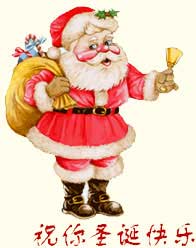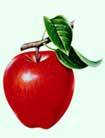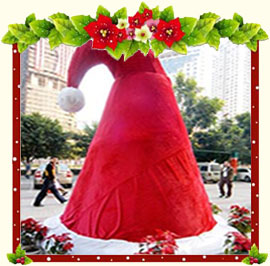Christmas in China

Merry Christmas in Chinese is “圣诞快乐 (Shèngdàn kuàilè)” and its literal meaning is to be happy on the birth of a saint.
“圣 (shèng)” in Chinese is a title of respect for honorific figures or things. For example, Confucius is one of the first “圣人 (shèngrén)” saints in Chinese history and so is addressed with this honorific title. Another example is that marriage is “神圣的 (shénshèng de)” sacred.
“诞 (dàn)” means geniture and we usually say “诞生 (dànshēng)” to be born in Chinese.
Therefore, “圣诞 (shèngdàn)” refers to the birth of a saint, specifically, Jesus.
“快 (kuài)” means quick or swift in its literal sense, which is used to describe speed. For example, he ran very “快 (kuài)” fast.
“乐 (lè)” means to be happy or cheerful and is used to describe a positive state of mind . It is usually used with a combination of other words like “快乐 (kuàilè)” happy, “乐观 (lèguān)” optimistic, “乐意 (lèyì)” be willing to etc.
So “快乐 (kuàilè)” takes on the meaning of “乐 (lè)”, which means to be happy.
As Chinese Christmas greetings, especially in text messages, “生蛋快乐 (shēngdàn kuàilè)” meaning “lay eggs happily” is popular among young people. This is a play on words as “生蛋 (shēngdàn)” and “圣诞 (shèngdàn)” have similar Chinese pronunciation.

Young people love to celebrate Christmas in China and do so by sending warm wishes to their friends and relatives. Let’s learn some Christmas related Chinese sentences.

1.Zhèxiē tiān lái yìzhí yŏu gè wèntí kùnhuò zhe wŏ: nǐ míngmíng búshì jī, wèishénme rénrén dōu yào zhù nǐ shēngdàn (Shèngdàn)
kuàilè ne?
这些天来一直有个问题困惑着我:你明明不是鸡,为什么人人都要祝你生蛋(圣诞)快乐呢?
A question has been confused me these days: why should everyone wish you to lay eggs happily (Merry Christmas) since you are
obviously not hen?
2.Hēi, nǐ zěnme hái zài zhè a? Nǐ zhīdào nǐ de zhòngyào xìng mɑ? Méi le nǐ, shuí lā zhe shèngdàn lăo gōnggong qù gěi dàjiā sòng lǐwù a? Shèngdàn kuàilè!
嗨,你怎么还在这啊?你知道你的重要性吗?没了你,谁拉着圣诞老公公去给大家送礼物啊?圣诞快乐!
Hey, how can you still be here? Do you know how important you are? Without you, who will send Santa Claus to give out gifts? Merry
Christmas!
3. Zài zhè měihăo de rìzi, méiyŏu huálì de cíjù, méiyŏu duōqíng de yányǔ, méiyŏu jīngměi de lǐpǐn, yŏu de zhǐshì péngyou shēnshēn
de zhùfú: Shèngdàn kuàilè!
在这美好的日子,没有华丽的词句,没有多情的言语,没有精美的礼品,有的只是朋友深深的祝福:圣诞快乐!
On this beautiful day, there is no flowery language; there are no sentimental words; there are no attractive gifts, but just a friend’s
deep blessing: Merry Christmas!

In the West, parents always pretend to be Santa Claus who comes from the “烟囱 (yāncōng)” chimney by filling their children’s “长筒袜 (chángtŏngwà)” stockings with presents while in China this popular cultural trend has not yet caught on. The apple is often given as a gift on Christmas in Chinese tradition because the word “苹果 (píngguŏ) apple” has a similar pronunciation to the word “平安夜 (Ping’ānyè) Christmas Eve”. Hence the apple has taken on the symbolisms of good luck and a happy future.
Learn Chinese words related to Christmas:
长筒袜 (chángtŏngwà) stockings

烟囱 (yāncōng) chimney

苹果 (píngguŏ) apple



With the increasing globalization of Western culture, Christmas has inevitably come to China. Christmas is becoming more and more important in China both in terms of a commercial gimmick and a cultural and religious festival. It is widely celebrated by all segments of society but as yet has not reached the national fever pitch of the west and so is not yet a holiday. However this does not perturb China’s youth who take great joy in sending out Christmas cards and holding get-togethers with family and friends.
Any Westerner walking down the street in a Chinese city will feel right at home as shops and businesses make the most of the festive spirit by adorning their shops with all the usual glitzy decorations one would expect to find in a Western country. There as also “绿色圣诞节 (lǜsè shèngdànjié) Green Christmas in China” on which students take part in many environmental protection activities such as, recycling, waste disposal and forest protection.
Sign up for a free trial now
Get a FREE live 1-to-1 lesson and FREE e-books. Complete the form below:
马上注册免费中文课程!
请填写下列表单,您将免费得到多本学中文的电子书和一节中文体验课。
馬上註冊免費的中文體驗課
請填寫下列表單,您將免費得到多本學中文的電子書和一節中文體驗課。
Sign up for a free trial now
Get a FREE live 1-to-1 lesson and FREE e-books. Complete the form below:
马上注册免费中文课程!
请填写下列表单,您将免费得到多本学中文的电子书和一节中文体验课。
馬上註冊免費的中文體驗課
請填寫下列表單,您將免費得到多本學中文的電子書和一節中文體驗課。




